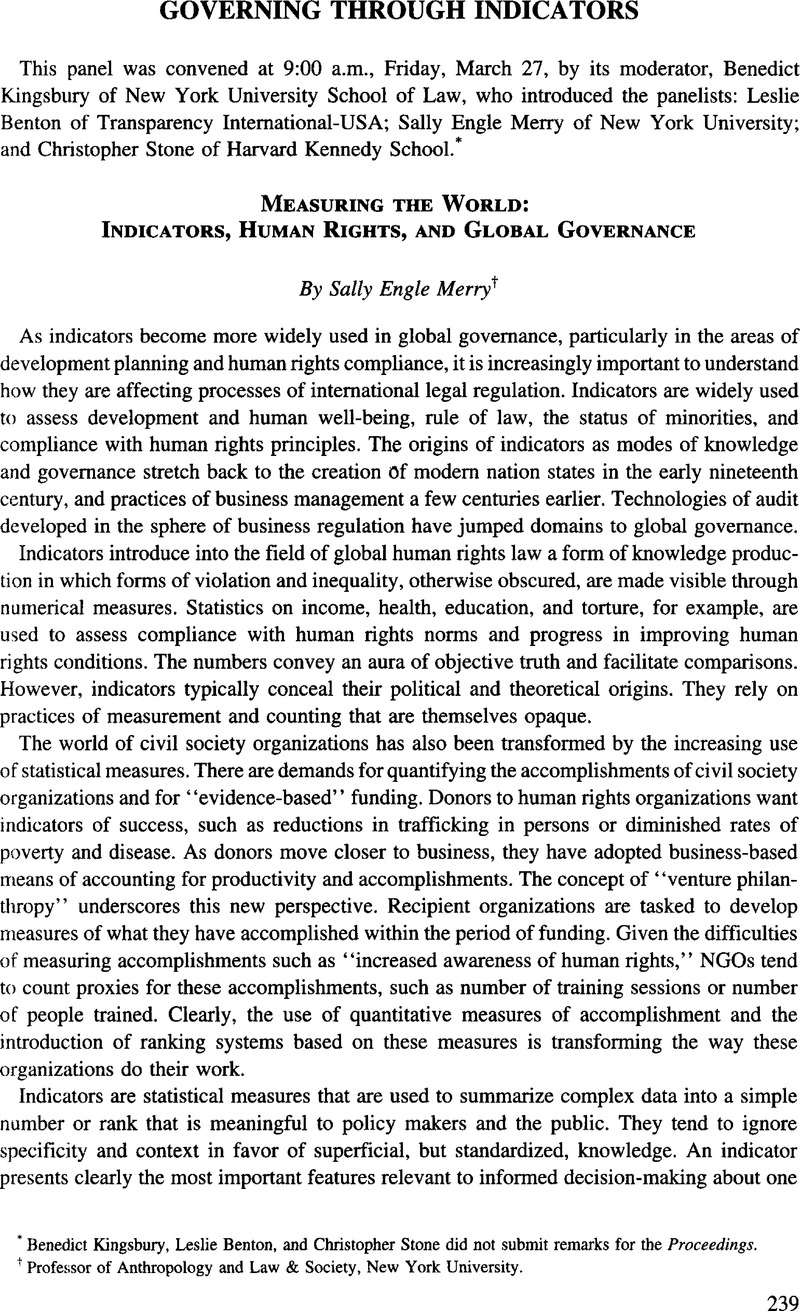Published online by Cambridge University Press: 28 February 2017

1 This document, reporting the discussion of an expert group meeting to develop an indicator for violence against women, convened by the United Nations Division for the Advancement of Women, the United Nations Economic Commission for Europe, and the United Nations Statistical Division, describes indicators as follows: “Indicators are part of the knowledge base needed to assist policy and decision-making. They help to raise awareness of an issue. Indicators, with their associated benchmarks, contribute to the monitoring of progress in achieving goals, and in policy evaluation. They enable an evidence-based comparison of trends over time, and within and between countries. Indicators on violence against women may also support the assessment of States’ exercise of their due diligence obligation to prevent and address violence against women, and the effectiveness of related policies and other measures.” U.N. Div. for the Advancement of Women, U.N. Econ. Comm’n for Europe, U.N. Stat. Div., Report of the Expert Group Meeting: Indicators to Measure Violence Against Women 4 (Oct. 2007).
2 Savatri Goonesekere, Introduction: Indicators for Monitoring Implementation of CEDAW 10-11 in CEDAW Indicators for South Asia: An Initiative. Unifem South Asia Regional Office, Centre for Women’s Research (Cenwor), Columbia, Sri Lanka (2004).
3 Davis, Kevin, What Can the Rule of Law Variable tell us about Rule of Law Reforms?, Mi. J. of Inťl L. 26, 152 (2004)Google Scholar.
4 See Daniel Kaufmann and Aart Kraay, Policy Research Working Paper 4370, Governance Indicators: Where are We, Where Should We Be Going? (2007).
5 Theodore M. Porter, Trust in Numbers: The Pursuit of Objectivity in Science and Public Life 25 (1995).
6 See id.
1 Id. at 121.
8 Id. at 85-86.
9 Id. at 74, 80-81.
10 Kevin Davis, supra note 3, at 26.
11 But see Rosga, AnnJanette and Satterthwaite, Margaret L. The Trust in Indicators: Measuring Human Rights, forthcoming in Berkeley J. Int’l L. (2008), Nyu School of Law, Public Law Research Paper No. 08-59 Google Scholar.
12 Strathern, Marilyn, Audit Cultures: Anthropological Studies in Accountability, Ethics, and the Academy 4 (2000)Google Scholar.
13 Id. at 57.
14 Id. at 4.
15 See id.
16 AnnJanette Rosga and Margaret L. Satterthwaite supra note 11.
17 Repon of Turku Expert Meeting on Human Rights Indicators, 10-13 (Mar. 2005) in Turku/Abo Finland, available at <http://web.abo.fi/institut/imr/RESearch/seminars/indicators/Report.doc>. (Dec. 17, 2008).
18 Marilyn Strathern, supra note 12, at 4.